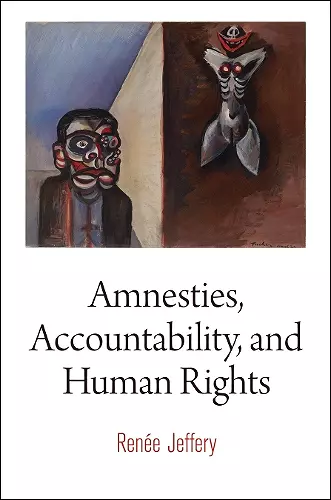Amnesties, Accountability, and Human Rights
Exploring the Dynamics of Justice and Reconciliation
Format:Hardback
Publisher:University of Pennsylvania Press
Published:26th May '14
Currently unavailable, and unfortunately no date known when it will be back

This insightful examination of amnesties reveals their enduring presence despite calls for accountability. Amnesties, Accountability, and Human Rights explores the evolving dynamics of justice and reconciliation.
In Amnesties, Accountability, and Human Rights, Renée Jeffery investigates the complex interplay between amnesties and the pursuit of justice over three decades. By examining over 700 amnesties implemented between 1970 and 2005, she highlights significant trends in their application and the evolving societal perceptions surrounding them. This comprehensive analysis reveals how amnesties have been utilized as tools for facilitating transitions to democracy, reconciling divided societies, and resolving violent conflicts, all while navigating the intricate landscape of international accountability norms.
The book delves into the increasing demands for accountability in response to documented human rights violations, a trend that has emerged prominently over the last thirty years. This rising call for justice challenges the traditional role of amnesties, which often preclude criminal prosecutions. Despite this pressure, Jeffery illustrates that the use of amnesties has not diminished since the 1970s; instead, they have been adapted to address contemporary political complexities and the competing demands of justice and reconciliation.
Amnesties, Accountability, and Human Rights ultimately sheds light on how this evolving political instrument reflects broader changes in human rights discourse. By tracing the historical trajectory of amnesties, the book offers valuable insights into the ongoing debate about the balance between forgiveness and accountability in post-conflict societies.
"In this unique contribution to the study of transitional justice, Renée Jeffery explores how and why amnesties remain popular despite the global push for human rights trials. She argues that they adapt to particular political moments and corresponding goals of democratic transition, truth, peace, and self-determination. Combining analysis of cross-national data on amnesties and historical comparative patterns, Jeffrey delivers new insights into the politics and persistence of amnesties." * Leigh Payne, University of Oxford *
ISBN: 9780812245899
Dimensions: unknown
Weight: unknown
312 pages